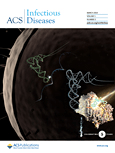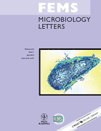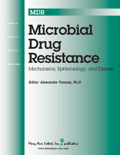
Antibiotics-Basel
Scope & Guideline
Uniting researchers to combat antibiotic resistance and promote health.
Introduction
Aims and Scopes
- Antimicrobial Resistance Mechanisms:
Research on the genetic, biochemical, and environmental factors contributing to the emergence and spread of antimicrobial resistance genes in various microbial populations. - Novel Antimicrobial Agents:
Development and evaluation of new antibiotics, including synthetic compounds, natural products, and their mechanisms of action against resistant pathogens. - Antibiotic Stewardship Practices:
Studies evaluating the effectiveness of antimicrobial stewardship programs in hospitals and community settings to optimize antibiotic use and reduce resistance. - Clinical Outcomes and Pharmacokinetics:
Research on the pharmacokinetics and pharmacodynamics of antibiotics, including dosing strategies and their impact on clinical outcomes in various populations. - Environmental Impact of Antibiotics:
Exploration of antibiotic residues in the environment and their role in selecting for resistant strains, including studies on wastewater treatment and agricultural runoff. - One Health Approach to Antibiotic Use:
Interdisciplinary research that addresses antibiotic resistance across human, animal, and environmental health sectors, emphasizing the interconnectedness of these fields.
Trending and Emerging
- Phage Therapy and Alternative Treatments:
An increasing number of studies are exploring bacteriophage therapy as a viable alternative to traditional antibiotics, especially for multi-drug-resistant infections. - Environmental Antibiotic Resistance Studies:
There is a growing focus on understanding the environmental factors contributing to the spread of antibiotic resistance, including studies on wastewater treatment and agricultural practices. - Machine Learning and AI in Antibiotic Research:
The integration of artificial intelligence and machine learning techniques to predict antibiotic resistance patterns and optimize treatment protocols is emerging as a significant trend. - Antimicrobial Peptides (AMPs):
Research into the development and application of antimicrobial peptides as novel therapeutic agents against resistant pathogens is gaining momentum. - Impact of Antibiotic Stewardship on Clinical Outcomes:
There is an increasing emphasis on evaluating the real-world impact of antimicrobial stewardship programs on patient outcomes and healthcare costs. - Resistance Mechanisms in Emerging Pathogens:
A trend towards investigating resistance mechanisms in new and emerging pathogens, particularly in the context of zoonotic diseases and public health implications.
Declining or Waning
- Traditional Antibiotic Usage Studies:
There has been a noticeable decrease in studies solely focused on traditional antibiotic usage patterns without integrating newer approaches or technologies. - Single-Agent Antibiotic Efficacy Studies:
Research focusing exclusively on the efficacy of single antibiotics is waning as there is a growing emphasis on combination therapies and multi-drug approaches to combat resistance. - Basic Research on Antibiotic Mechanisms:
While still relevant, the focus on purely mechanistic studies of antibiotics is declining in favor of translational research that bridges laboratory findings with clinical applications. - Antibiotic Resistance in Non-Clinical Settings:
There is a noticeable decrease in studies addressing antibiotic resistance in non-clinical environments, such as community settings outside hospitals, as the focus shifts towards clinical implications and hospital-acquired infections.
Similar Journals

JOURNAL OF MICROBIOLOGY
Unveiling the mysteries of microbes for health and industry.JOURNAL OF MICROBIOLOGY, published by the Microbiological Society Korea, is a prestigious peer-reviewed journal dedicated to the advancement of knowledge in the fields of microbiology, applied microbiology, and biotechnology. Established in 1996, this journal serves as a vital platform for researchers and professionals from around the globe to disseminate their findings and engage in multidisciplinary discussions pertaining to microbial sciences. With an H-index that reflects its impact, the journal holds a commendable Q2 ranking in key categories including Applied Microbiology and Biotechnology, as well as Medicine (Miscellaneous), which underscores its significance in the academic community. Despite being a subscription-based journal, the JOURNAL OF MICROBIOLOGY aims to contribute to the understanding of microbial processes and their applications, facilitating advancements that are essential in health, industry, and environmental sciences. Researchers, students, and practitioners are encouraged to explore this rich resource for the latest research and trends in microbiology.

ACS Infectious Diseases
Advancing the Science of Infectious Disease ManagementACS Infectious Diseases is a premier journal in the field of infectious diseases, published by the American Chemical Society. With an impressive Impact Factor that places it in the Q1 category for Infectious Diseases in 2023, the journal serves as an essential resource for researchers, healthcare professionals, and students dedicated to the study of infectious agents and their impact on public health. Established in 2015, the journal is committed to publishing cutting-edge research that enhances our understanding of infectious diseases and fosters the development of innovative interventions. Although not an open access journal, it provides a platform for high-quality research that influences policies and practices in the field. With an address located at 1155 16TH ST, NW, WASHINGTON, DC 20036, ACS Infectious Diseases is an authoritative voice in advancing the science and practice of infectious disease management.

Indonesian Journal of Pharmacy
Catalyzing advancements in pharmacy for a sustainable future.Indonesian Journal of Pharmacy (ISSN: 2338-9486; E-ISSN: 2338-9427), published by UNIV GADJAH MADA, FAC FARMASI, stands as a significant platform for disseminating pioneering research in the field of pharmacy and pharmacology. Since its transition to an Open Access format in 2011, the journal has enhanced its visibility and accessibility, catering to a global audience of researchers, practitioners, and students. With a commendable Q3 category ranking in Pharmaceutical Science, Pharmacology, and Pharmacy for 2023, along with its respectable Scopus ranks, it provides valuable insights and advancements in the pharmaceutical sciences, particularly relevant to the Indonesian context and beyond. The journal not only supports the academic community but also contributes to the enhancement of healthcare practices through rigorous peer-reviewed publications. By fostering knowledge exchange and collaboration, the Indonesian Journal of Pharmacy aims to play a pivotal role in advancing research and development in pharmacy-related disciplines.

FEMS MICROBIOLOGY LETTERS
Illuminating the Pathways of Microbial ResearchFEMS Microbiology Letters, published by Oxford University Press, is a prestigious international journal dedicated to advancing the understanding of microbiology through concise and impactful research articles. With an ISSN of 0378-1097 and E-ISSN 1574-6968, this journal encompasses a wide range of topics within the fields of genetics, microbiology, and molecular biology, achieving a notable Q3 quartile ranking in these categories as of 2023. As an essential platform for researchers, professionals, and students, FEMS Microbiology Letters invites submissions that contribute valuable insights into microbial behaviors, genetic mechanisms, and innovative methodologies pivotal in the study of microbiology. Although it is not an open-access publication, the journal's rigorous editorial standards ensure high-quality content that is relevant and significant to its audience, furthering scholarly dialogue and collaboration in the vibrant field of microbiological research.

JOURNAL OF CHEMOTHERAPY
Unveiling the Future of Chemotherapy PracticesJournal of Chemotherapy is a distinguished peer-reviewed academic journal published by Taylor & Francis Ltd, focusing on the dynamic fields of infectious diseases, oncology, and pharmacology. With its ISSN 1120-009X and E-ISSN 1973-9478, this journal has been at the forefront of chemotherapy research since its inception in 1989 and continues to play a vital role in advancing medical science through rigorous studies and reviews. It currently holds a respectable position in various Scopus categories, ranked Q3 in several important disciplines, reflecting its commitment to providing quality research. Although it operates under a subscription model, Journal of Chemotherapy remains a crucial resource for practitioners and academics alike, facilitating knowledge exchange and innovation in the treatment of diseases through chemotherapy. With access to the latest findings and therapeutic advancements, this journal is a must-read for researchers, medical professionals, and students seeking to enhance their understanding of emerging trends in chemotherapy.

Surgical Infections
Elevating standards in the study of surgical infections.Surgical Infections, published by MARY ANN LIEBERT, INC, is an esteemed journal dedicated to advancing the understanding and management of infections associated with surgical procedures. With an ISSN of 1096-2964 and an E-ISSN of 1557-8674, this journal has emerged as a vital resource within the fields of Infectious Diseases, Surgery, and Microbiology. Over the years, it has established a notable presence, achieving a 2023 Q2 ranking in Infectious Diseases and Surgery, as well as a Q3 ranking in Microbiology. The journal holds an impressive position at 74th percentile in Surgery according to Scopus, making it a reliable platform for disseminating current research and clinical practices. Surgical Infections aims to provide an interdisciplinary forum for both seasoned professionals and academics, encouraging the exploration of novel therapeutic approaches, prevention strategies, and case studies that address the complexities of surgical-related infections. As the field continues to evolve, this journal remains committed to fostering innovative research that enhances clinical outcomes and patient safety.

Revista Espanola de Quimioterapia
Fostering Innovation in Clinical Microbiology Since 1989The Revista Espanola de Quimioterapia, published by the SOCIEDAD ESPANOLA QUIMIOTERAPIA, is a pivotal open-access journal that has been advancing the field of clinical microbiology and pharmacology since its inception in 1989. With an E-ISSN of 1988-9518, this journal caters to a diverse audience of researchers, healthcare professionals, and students, providing them with critical insights into the latest developments in medicinal chemistry and therapeutic strategies. Located in Madrid, Spain, the journal reflects the rigorous academic standards of its associated institutions, contributing significantly to the translation of research into clinical practice. Achieving a Q3 ranking in the fields of Medicine, Microbiology, and Pharmacology in 2023 attests to its growing influence and relevance in the scientific community, making it a vital resource for those engaged in the quest for innovative solutions to pressing healthcare challenges. The journal prides itself on its commitment to maintaining an open-access model since 2018, ensuring that vital research is freely accessible to foster greater knowledge sharing and collaboration within the global scientific community.

International Journal of Microbiology
Connecting Researchers Across Borders in MicrobiologyWelcome to the International Journal of Microbiology, a premier platform dedicated to the dissemination of cutting-edge research in the field of microbiology. Published by HINDAWI LTD, this open-access journal has been making significant strides since its inception in 2009, ensuring that high-quality research is accessible to all. Situated in Egypt, the journal caters to an international audience, fostering collaboration across borders. With a commendable impact factor and recognized in the Q2 category for both general and medical microbiology, it ranks 48th out of 182 and 40th out of 140, respectively, according to Scopus statistics, placing it among the top-tier journals in its field. The International Journal of Microbiology publishes articles that explore various aspects of microbiology, from fundamental studies to applied research, thus contributing significantly to advancements in medical, agricultural, and environmental microbiology. This journal is an essential resource for researchers, professionals, and students eager to stay at the forefront of microbiological studies and their applications.

Microbial Drug Resistance
Pioneering Insights in Microbial Resistance and PharmacologyMicrobial Drug Resistance, published by MARY ANN LIEBERT, INC, is a pivotal journal that explores the critical intersection of microbiology and pharmacology with a keen focus on antibiotic resistance and related issues. Since its inception in 1995, this journal has established itself as a vital resource for researchers, healthcare professionals, and students, offering a platform for innovative studies that inform the global response to antimicrobial resistance. With a commendable position in the Category Quartiles, ranked Q2 in Medicine (miscellaneous) and Q2 in Pharmacology for 2023, it caters to a multidisciplinary audience by addressing the implications of microbial resistance within various medical contexts. Although currently non-Open Access, the journal allows subscribers and institutions to access high-quality, peer-reviewed research, directly impacting policy and practice in healthcare settings. Committed to advancing our understanding and combating the challenges posed by resistant microbes, Microbial Drug Resistance remains an essential publication in the fields of microbiology, immunology, and pharmacology.

Lancet Microbe
Pioneering Discoveries in Global Health ChallengesThe Lancet Microbe is a leading peer-reviewed journal published by ELSEVIER, focused on advancing research in the fields of infectious diseases, microbiology, and virology. Since its inception in 2020, this open-access journal has rapidly achieved a prestigious reputation, evidenced by its impressive rankings in the Scopus Ranks, where it holds positions within the top 10 in multiple categories and boasts high percentiles, reflecting the impact and relevance of its published works. With a quarterly publication schedule, the Lancet Microbe aims to disseminate critical findings and foster innovation within the scientific community, providing a platform for researchers and professionals to share their significant contributions. The journal is committed to facilitating knowledge exchange and accessibility, making it an essential resource for academicians and practitioners dedicated to addressing global health challenges.